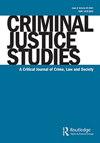A qualitative exploration of dual vulnerability: cybersecurity and social isolation risks for Alzheimer’s caregivers during the COVID-19 pandemic
IF 1.1
Q3 OPERATIONS RESEARCH & MANAGEMENT SCIENCE
引用次数: 0
Abstract
ABSTRACT This exploratory study investigated the impact of the COVID-19 pandemic on the social isolation and potential cybersecurity risks of Alzheimer’s and other dementia caregivers. Through interviews and focus groups with caregivers, we examined the isolation and risks of Alzheimer’s caregivers relative to their caregiving responsibilities during the pandemic in Virginia. The results illustrated the general isolation, frustration and vulnerability of dementia caregivers – frustration with and vulnerability to the virus, lack of resources and supports, and to cybercrime. Most caregivers expressed frustration with losing supports and services during the pandemic, not knowing what services were available or how to access them, and wanting virtual supports on their terms (e.g. where and when they needed them, how often, etc.). Virtual supports that did not meet their needs also increased their vulnerability to stress and isolation. While many caregivers understood their risks for cybercrime, they perceived themselves as lacking some technological knowledge needed to remain safe thus adding to stress and caregiving burden. The results show the need for training/education and general information about how to protect those who may be caring for others from cybercrime. Screening tools to identify those at risk for cybercrime would also be useful.对双重脆弱性的定性探索:COVID-19大流行期间阿尔茨海默氏症护理人员的网络安全和社会隔离风险
本文章由计算机程序翻译,如有差异,请以英文原文为准。
求助全文
约1分钟内获得全文
求助全文
来源期刊

CRIMINAL JUSTICE STUDIES
OPERATIONS RESEARCH & MANAGEMENT SCIENCE-
CiteScore
2.80
自引率
5.60%
发文量
17
期刊介绍:
Criminal Justice Studies, a quarterly refereed journal, publishes articles that deal with substantive criminal justice and criminological issues. The journal welcomes all articles that are relevant to the issue of criminal justice, as well as those that may be outside the field but have relevancy to the topic of criminal justice. Articles that cover public administration, issues of public policy, as well as public affairs issues are welcome. The journal also publishes relevant literature reviews, research notes and summary reports of innovative research projects in criminal justice. Qualitative and quantifiable articles are sought mainly from academics and researchers in the field, though articles from professionals will also be considered.
 求助内容:
求助内容: 应助结果提醒方式:
应助结果提醒方式:


